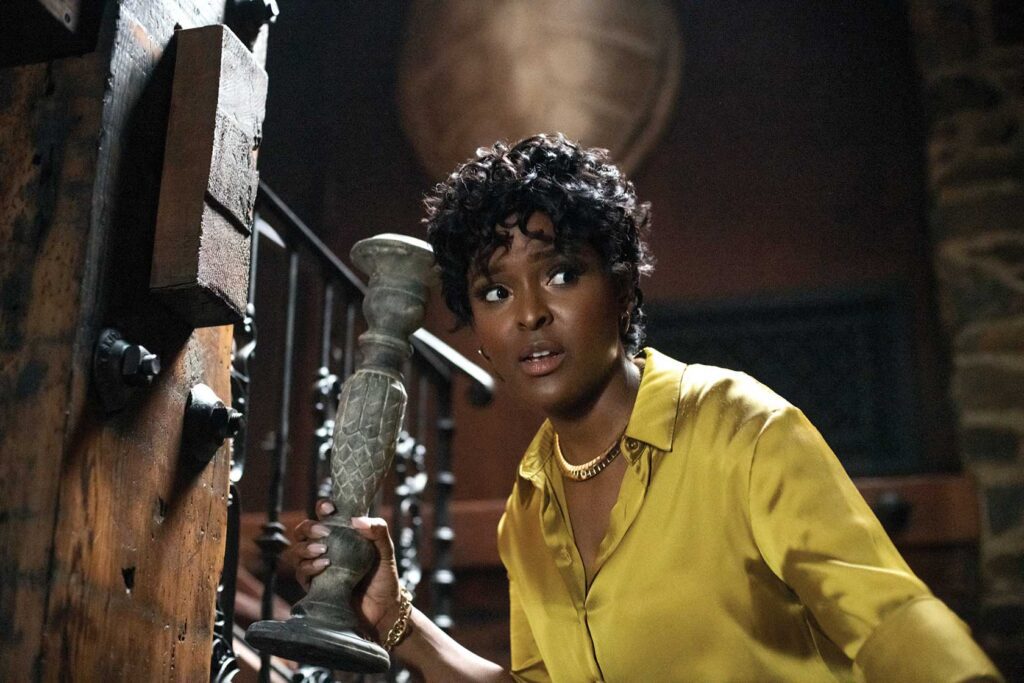‘The Blackening’ races against horror tropes to make you laugh, scream and think

How many African American people does it take to pass a Black history test on Juneteenth?
This sounds like the start of a bad joke, but it’s the question I asked myself as I watched “The Blackening,” the new comedy horror film from director Tim Story (“Barbershop” and “Think Like a Man”).
“The Blackening” follows a group of college friends who rent a cabin in the woods to celebrate Juneteenth. After the group’s arrival, drug-induced hilarity ensues, and the gang eventually gets locked in a room with a racist board game called “The Blackening.” It tries to kill each of them off when they answer a Black trivia question incorrectly.
The well-paced movie aims to turn a horror film trope on its head. If Black people typically die first in horror films, then who dies when everyone is Black? With Story in the director’s chair and the screenplay written by Tracy Oliver (“Girls Trip”) and Dewayne Perkins (who plays the character Dewayne), the film’s origins as a sketch comedy skit are apparent in the hands of this comedic trio. The script is funny, with numerous intracultural jokes and nods to other Black films like “Get Out,” “Sister Act” and “Set it Off.” However, there’s much to be desired from this satire. It is rife with millennial slang and cursing that could alienate older and more conservative viewers.

Melvin Gregg as King, Grace Byers as Allison, Antoinette Robertson as Lisa, Sinqua Walls as Nnamdi, Jermaine Fowler as Clifton, Dewayne Perkins as Dewayne, and Xochitl Mayo as Shanika in The Blackening. PHOTO: GLEN WILSON
Some of actors’ delivery of the jocose dialogue make the friends appear more like one-dimensional caricatures than well-developed characters. Each character represents a different facet of the Black experience so the film can ask an essential question: What is Blackness?
Perkins’ Dewayne represents a gay African American man. Grace Byers is Allison, a biracial woman who is loud and proud about her Black heritage. Lisa is Allison’s bougie best friend and attorney, played by Antoinette Robertson. X Mayo plays party girl and resident drunk Shanika. Sinqua Walls is playboy Nnamdi. Melvin Gregg is King, a reformed ruffian. Jermaine Fowler plays Clifton, the awkward nerd of the group. Actor-comedians Yvonne Orji (“Insecure”) and Jay Pharaoh (“Saturday Night Live”) play Morgan and Shawn respectively, the couple who arrives at the house first.
A strength of the film is the use of physical comedy. Perkins’ body language in particular seems almost instinctual. When Dewayne is high on molly and dancing one minute and spooked by opening doors and strange sounds the next, his expressive eyes, pursed lips and exaggerated movements are more humorous than any words in those moments.
The acting in between the laughs is lukewarm at best. Robertson seems flat when delivering most of her lines. Byers overacts in some scenes and under-delivers in others. Fowler’s performance adds an awkwardness to the group dynamic that serves as comedic relief. It isn’t believable per se, but is welcome when compared to the duller performances in the film.
“The Blackening” is a hilarious and at times offensive film that asks, ‘What is authentic Blackness? Is there a way to define it or embody it?’ Considering the title, can one essentially “Blacken” over time through shared relationships, experiences and having a similar collective response to horror and trauma? Are there diverse ways to embody Blackness?
Although it has its faults, “The Blackening” adds to the conversation about race in the horror genre. It’s not perfect, but it’s a start.
“The Blackening” opened June 16 in theaters nationwide.






